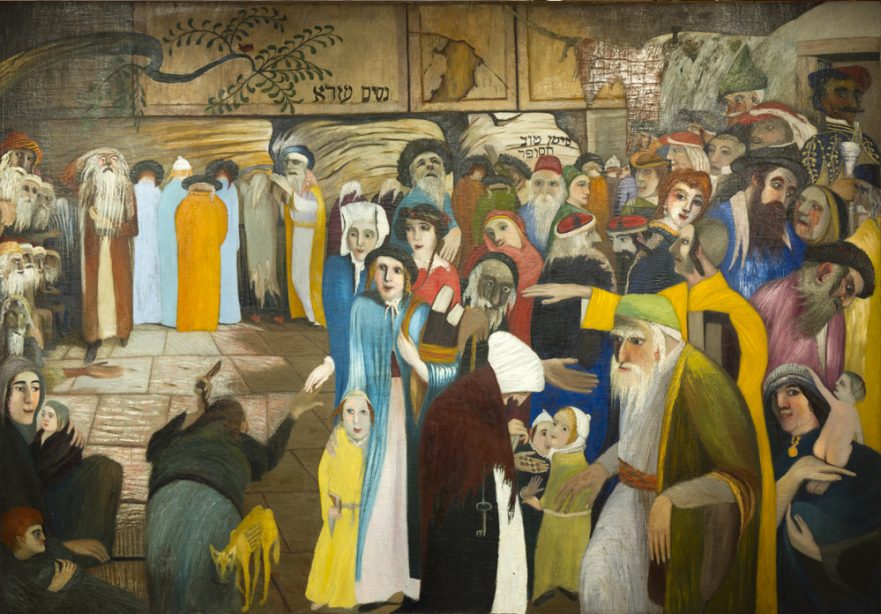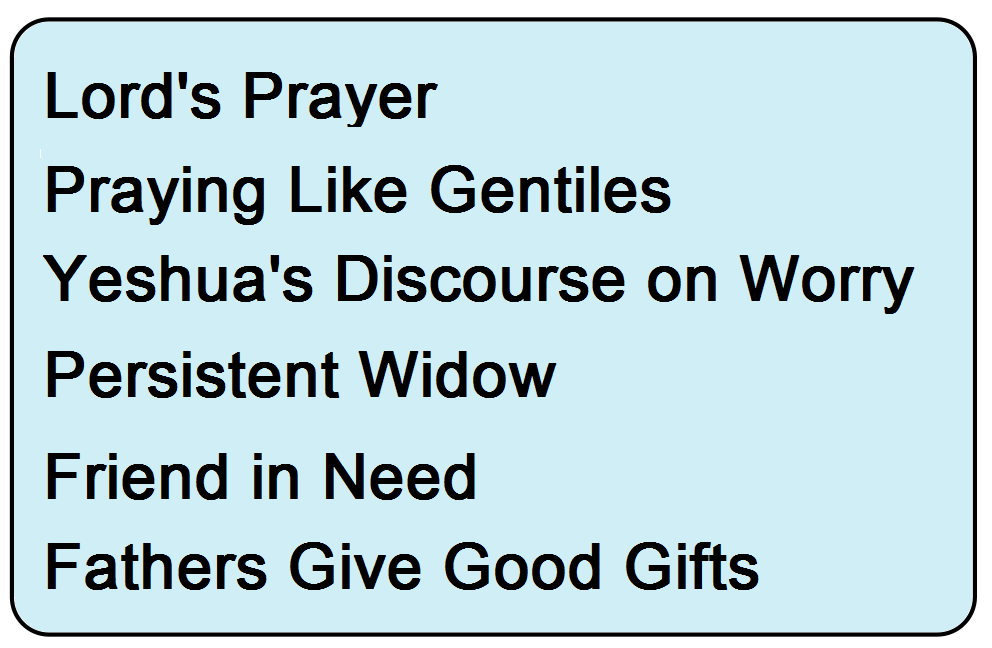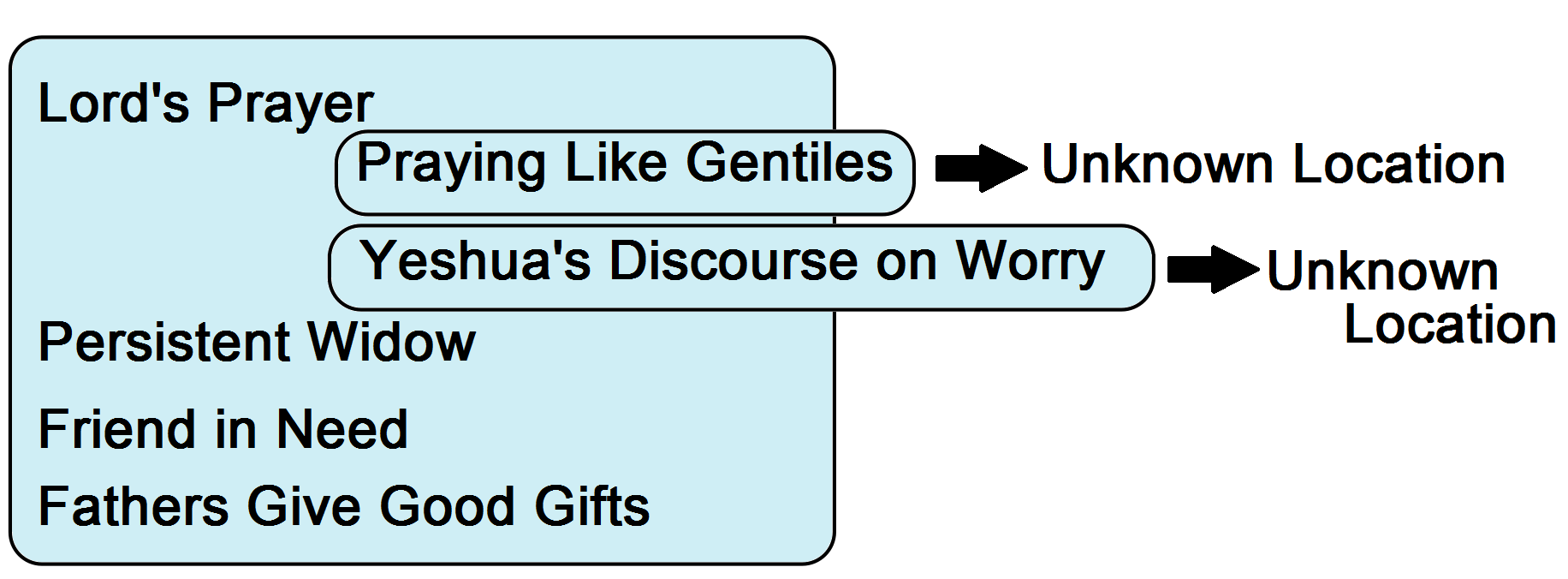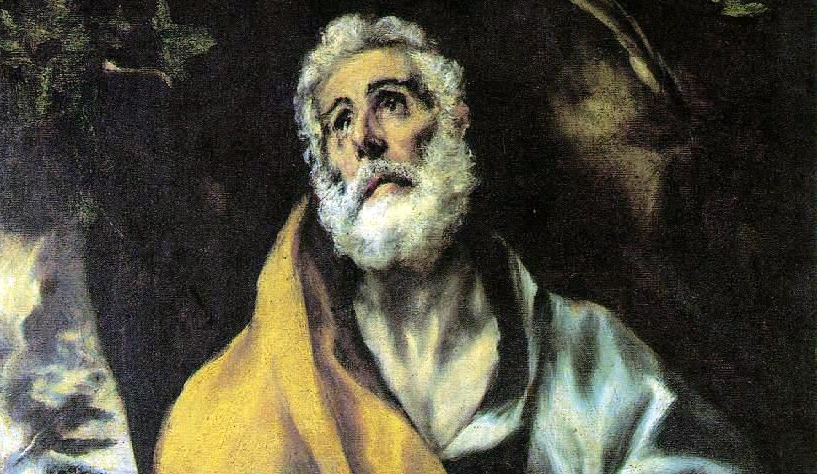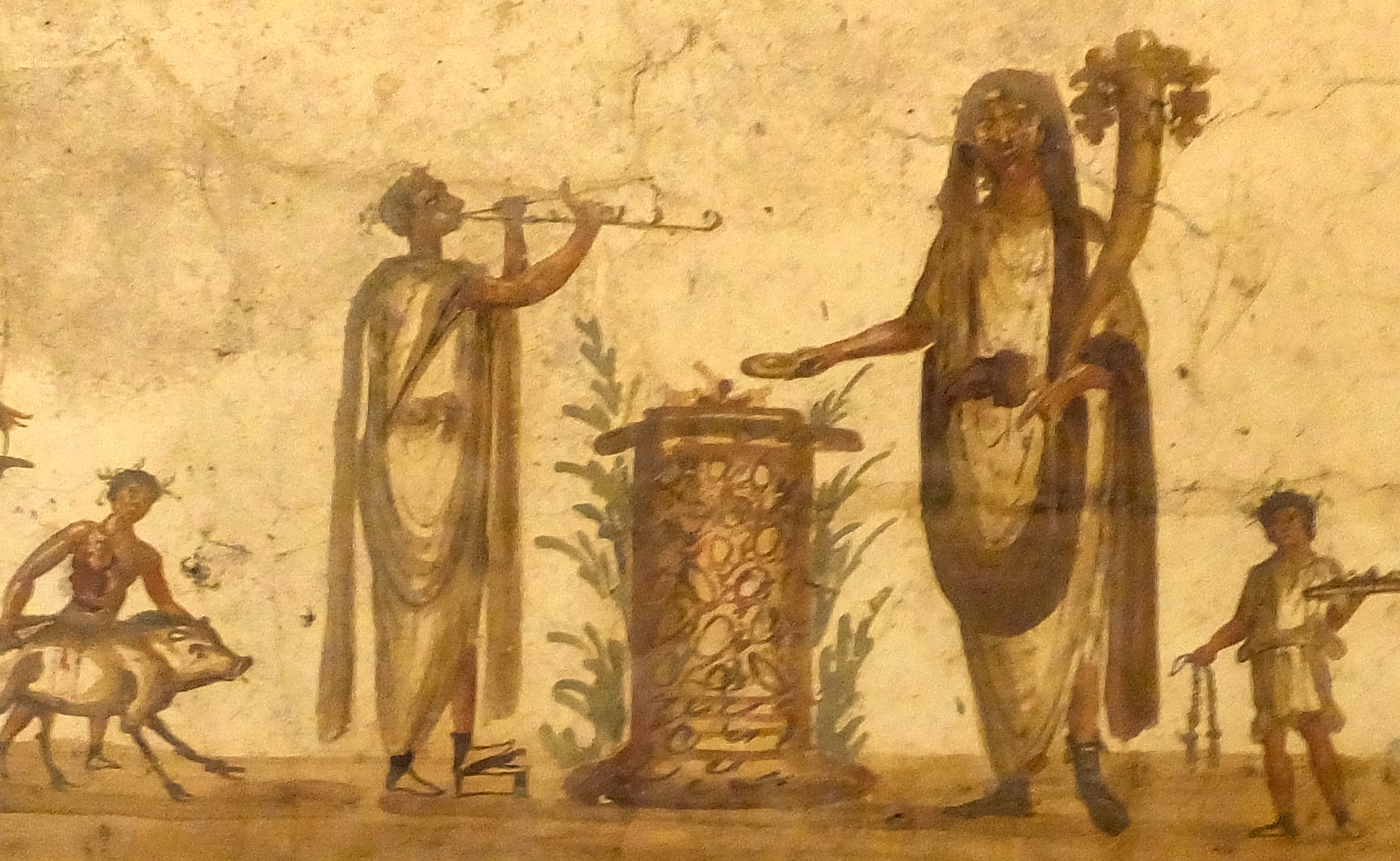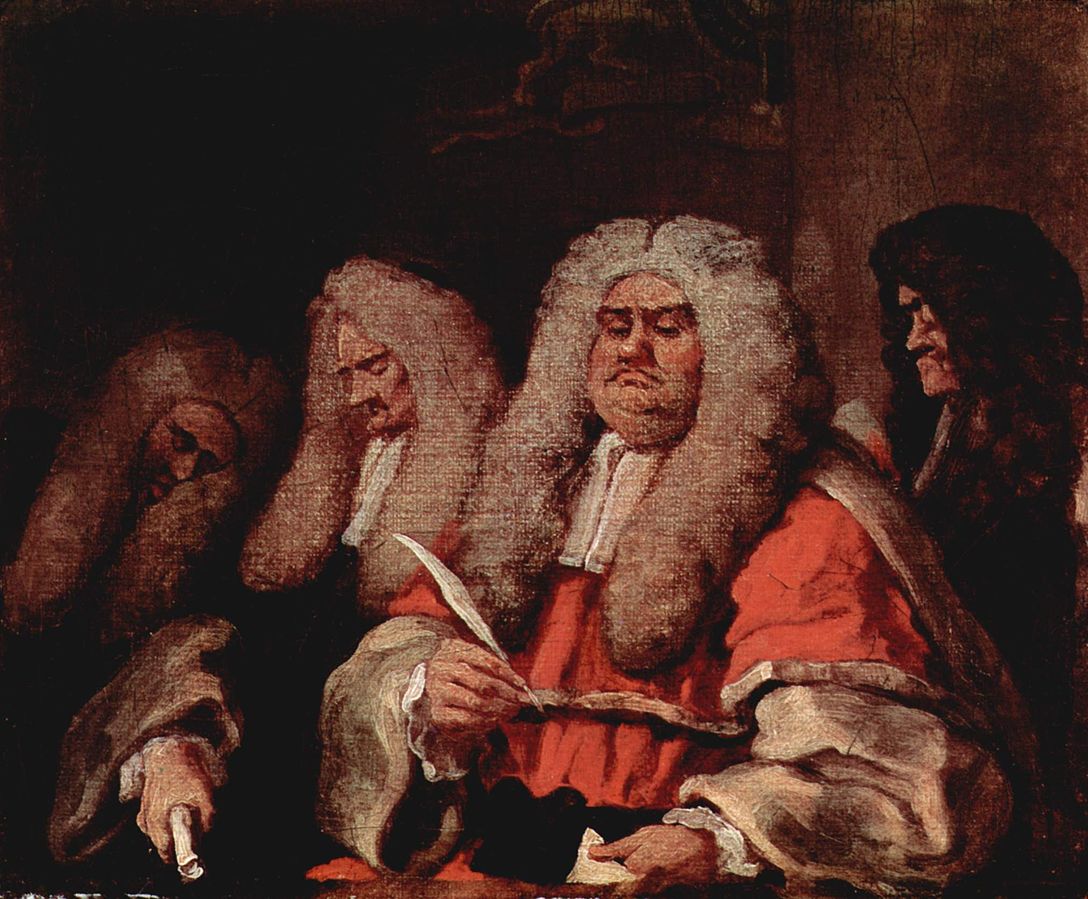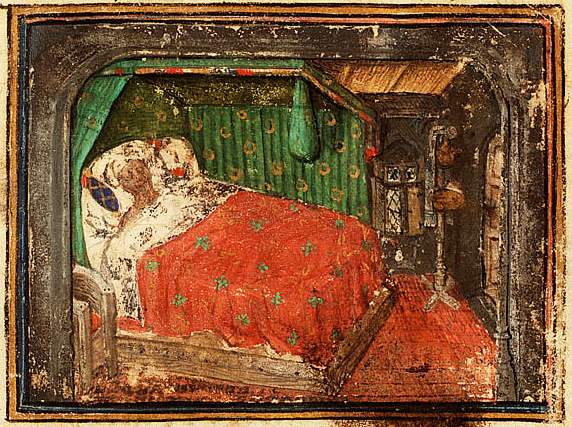Updated: 30 October 2024
During the period when Jesus was schooling his disciples, one of the disciples asked on behalf of the others that Jesus give them instruction regarding prayer. In response to this request, Jesus taught the disciples what has come to be known as the Lord’s Prayer.[1] After teaching them what to pray, Jesus further instructed the disciples on how to pray, namely with confidence that God already knows their needs and intends to grant their requests. In the many illustrations with which Jesus concluded his teaching on prayer, Jesus focused on the character of the God to whom they pray. The God of Israel is not a monster or a miser; he is neither an unscrupulous judge nor a boorish friend. The God to whom the disciples pray is a good father who knows how to give good gifts to his children, just as the disciples knew how to give good gifts to theirs.[2] On the basis of God’s character as the true judge of the nations, the faithful friend of humankind, and the loving father of all creation, Jesus encouraged his disciples to have full confidence when they prayed the petitions of the Lord’s Prayer. God would indeed sanctify his name and vindicate his people, and he would indeed supply the disciples, who had cast themselves completely upon his care, with what they needed each day in order to serve him.
Matthew’s Gospel contains almost all of the pericopae that, according to our reconstruction, originally belonged to the “How to Pray” complex, the only exception being the Persistent Widow parable, which is unique to the Gospel of Luke. Nevertheless, very few of the “How to Pray” pericopae occur in Matthew in their original order. In part this is due to the reordering of material by the Anthologizer, but much of the rearrangement should be attributed to the author of Matthew. It is possible to gauge how much of the rearranging of the “How to Pray” pericopae was due to the author of Matthew because in Luke’s Gospel almost all of the pericopae that originally belonged to the “How to Pray” complex occur in a single block of material (Luke 11:1-13). This block of material is what remained of the original “How to Pray” complex after the Anthologizer had removed the Praying Like Gentiles pericope (Matt. 6:7-8) and Yeshua’s Discourse on Worry (Matt. 6:25-34; Luke 12:22-31), and after the author of Luke had removed the Persistent Widow parable (Luke 18:1-8).[3] Thus, the author of Luke copied the Anthology’s block of “How to Pray” material in its entirety, preserving almost all of it (except the Persistent Widow parable) in the same order as it had appeared in the Anthology.[4]
Restored to its conjectured original sequence, we find that a central theme of the “How to Pray” complex was the disciples’ utter dependence on God to provide for their bodily needs. In the Lord’s Prayer Jesus taught the disciples to pray only for their present needs. The petition for daily bread reflected the rigorous lifestyle Jesus demanded of his disciples, whom Jesus required to leave behind family and personal property and to abandon their livelihoods in order to itinerate with him full-time. In return for committing themselves exclusively to the Kingdom of Heaven, Jesus assured his disciples that God would provide for their needs day by day, just as God had provided manna day by day for Israel during their forty years in the desert. Agreeing to such rigorous demands with only Jesus’ word for surety was an expression of radical trust on the part of the disciples—a trust that the disciples must have found difficult to sustain. This difficulty explains why a daily renewal of their commitment to their rigorous lifestyle through the recitation of the Lord’s Prayer was considered to be necessary; it also explains why so much of Jesus’ instruction in the “How to Pray” complex focused on God’s generosity and trustworthiness of character. When the disciples were tempted to doubt that God could or would provide, the down-to-earth illustrations of God’s provision for the birds of the air and the grass of the field, and the homely reminders of how the disciples treated their own friends and family members reassured the disciples that God was no less able and no less willing to provide for them. Jesus’ gentle handling of the disciples’ fears and his understanding of their doubts is a model of wise leadership and mature pastoral care.
Click on the following titles to view the Reconstruction and Commentary for each pericope in the “How to Pray” complex.
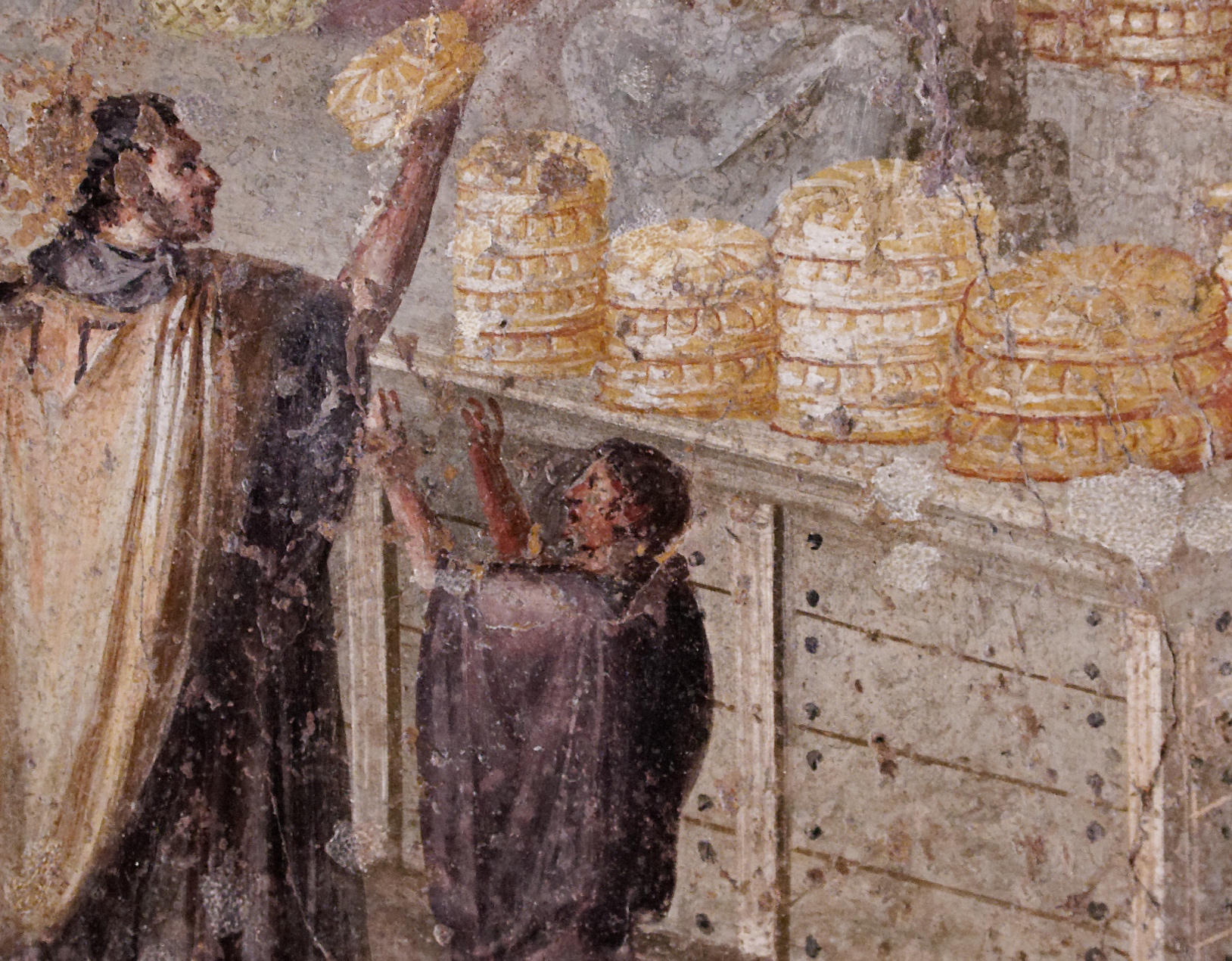 Fathers Give Good Gifts simile
Fathers Give Good Gifts simile
To demonstrate how the segments of the “How to Pray” complex fit together, we have assembled our paraphrases of the Hebrew reconstructions of the individual segments below. We have also assembled the Greek and Hebrew reconstructions of the entire complex and presented them following the English paraphrase.
On one occasion, Yeshua was praying at a certain location. After he finished his prayers, one of his disciples said to him, “Lord, teach us to pray, just as Yohanan the Immerser taught his disciples to pray.” So Yeshua told them, “When you pray, say: ‘Heavenly Father, may you be praised throughout the earth by everyone—including us! Reign soon over everyone—and over us, as well! May your will be done everywhere—and in our lives, too! Give us what’s necessary for the day ahead, neither more nor less than we need! Forgive the things we can’t make up to you, since even we forgive the things others ought to make up to us. Don’t let us fall when we’re tested, but rescue us from bad things that might occur.’
“And don’t blather while you pray as the Gentiles do, since they believe that by uttering pre-formulated incantations their prayers will be granted. So don’t imitate them, for your father knows what you need even before you ask him.”
[And Yeshua said to his disciples,] “So don’t be filled with anxiety about your lives, how you will eat and drink, or about your bodies, how you will be dressed. Isn’t life itself more important than the fuel that keeps it going? And isn’t the body more important than the clothes that keep it covered? If God provided the former, won’t he provide the latter as well? Take a look at the ravens who neither sow seed, nor harvest crops, nor store their harvest in storehouses. Nevertheless, God maintains them. How much more, then, will God maintain you, who are far more important than the birds of the sky?
“Or which of you worriers is able to make his body grow taller? Then why are you filled with anxiety about clothing? See how the flowers of the field grow: they neither labor nor spin, but I can assure you that even when King Shlomoh was decked out in the finest of his royal robes, he wasn’t dressed as well as them. If this is how God chooses to clothe the grass of the field, though it lasts only for a day and then is burned in an oven, how much more adequately will God clothe you, you doubters?
“So don’t be filled with anxiety asking, ‘What will we eat?’; or, ‘What will we drink?’; or, ‘How will we clothe ourselves?’ These are all the things Gentiles constantly demand; and your father already knows you need all these things. Rather, seek God’s Kingdom and his deeds of salvation, and he will add all these things to you as well.
“So don’t be filled with anxiety about tomorrow. Tomorrow can worry about itself. It is enough to let each day deal with its own difficulties.”
Then Yeshua told them this parable: “There was a judge in a certain town who was not a God-fearing man, neither was he concerned about human welfare. Nevertheless, there was a widow in that town who kept coming to him demanding, ‘Rescue me from my legal opponent’s power!’ But the judge kept refusing her for a long time.
Some time later, however, the judge thought to himself, ‘Although I am not a God-fearing man, and although I have no concern for human welfare, yet because this widow keeps on bothering me, I will rescue her, or else she’ll keep on coming to pester me forever!’”
And the Lord said, “Consider what the wicked judge did. And will not God all the more work justice on behalf of his chosen ones who cry out to him day and night to be rescued? Do you think he holds himself back from helping them? I can assure you that he will swiftly bring them justice.”
He also said to them, “Which of you, if a friend came to you at midnight and said, ‘Friend, be so kind as to lend me three loaves of bread, since a friend of mine has returned from a journey, but I don’t have anything to serve him!’ would say from inside the house, ‘Don’t come to me with your troubles! My door is already shut and my children are here in bed with me. I can’t give you what you need!’? Not one of you would behave that way!
“I tell you: Even if there was such a boor who would behave that way, even if he wouldn’t help his friend because of their mutual friendship, yet because of his friend’s brazenness he’d end up giving him everything he needs.
“Therefore, I tell you: Ask, and God will give to you. Search for him, and you will find God. Knock on his door, and God will open it to you. Because everyone who asks God receives, and everyone who searches for God finds him, and to everyone who knocks God opens his door wide.
“Now what father is there among you who, when his son asks for bread, would give him a rock instead? Or if he asks for a fish, would give him a snake instead? Or if he asks for an egg, would give him a scorpion? Not a single one of you! So if even you, with your inclination to do evil, still instinctually give good gifts to your children, how much more do you think your heavenly Father will give good gifts to his children when they ask him?”
Greek Reconstruction
καὶ ἐγένετο ἐν τῷ εἶναι αὐτὸν ἐν τόπῳ τινὶ καὶ προσηύξατο καὶ ὡς ἐπαύσατο εἶπέν τις τῶν μαθητῶν αὐτοῦ πρὸς αὐτόν κύριε δίδαξον ἡμᾶς προσεύχεσθαι καθὼς Ἰωάνης ἐδίδαξε τοὺς μαθητὰς αὐτοῦ εἶπεν δὲ αὐτοῖς ὅταν προσεύχησθε λέγετε πάτερ ἡμῶν ὁ ἐν τοῖς οὐρανοῖς ἁγιασθήτω τὸ ὄνομά σου ἐλθέτω ἡ βασιλεία σου γενηθήτω τὸ θέλημά σου ὡς ἐν οὐρανῷ καὶ ἐπὶ γῆς τὸν ἄρτον ἡμῶν τὸν ἐπιούσιον δὸς ἡμῖν σήμερον καὶ ἄφες ἡμῖν τὰ ὀφειλήματα ἡμῶν ὡς καὶ ἡμεῖς ἀφήκαμεν τοῖς ὀφειλέταις ἡμῶν καὶ μὴ εἰσενέγκῃς ἡμᾶς εἰς πειρασμόν ἀλλὰ ῥῦσαι ἡμᾶς ἀπὸ τοῦ πονηροῦ
προσευχόμενοι δὲ μὴ βατταλογήσητε ὥσπερ οἱ ἐθνικοί δοκοῦσιν γὰρ ὅτι ἐν τῇ πολυλογίᾳ αὐτῶν εἰσακουσθήσονται μὴ οὖν ὁμοιωθῆτε αὐτοῖς οἶδεν γὰρ ὁ πατὴρ ὑμῶν ὧν χρείαν ἔχετε πρὸ τοῦ ὑμᾶς αἰτῆσαι αὐτόν
[εἶπεν δὲ πρὸς τοὺς μαθητὰς αὐτοῦ] διὰ τοῦτο λέγω ὑμῖν μὴ μεριμνᾶτε τῇ ψυχῇ ὑμῶν τί φάγητε ἢ τί πίητε μηδὲ τῷ σώματι ὑμῶν τί ἐνδύσησθε οὐχὶ ἡ ψυχὴ πλεῖόν ἐστιν τῆς τροφῆς καὶ τὸ σῶμα τοῦ ἐνδύματος ἐμβλέψατε εἰς τοὺς κόρακας ὅτι οὐ σπείρουσιν οὐδὲ θερίζουσιν οὐδὲ συνάγουσιν εἰς ἀποθήκας καὶ ὁ θεὸς τρέφει αὐτούς πόσῳ μᾶλλον ὑμεῖς διαφέρετε τῶν πετεινῶν τοῦ οὐρανοῦ τίς δὲ ἐξ ὑμῶν μεριμνῶν δύναται προσθεῖναι ἐπὶ τὴν ἡλικίαν αὐτοῦ πῆχυν ἕνα καὶ περὶ ἐνδύματος τί μεριμνᾶτε καταμάθετε τὰ κρίνα τοῦ ἀγροῦ πῶς αὐξάνουσιν οὐ κοπιῶσιν οὐδὲ νήθουσιν λέγω δὲ ὑμῖν ὅτι οὐδὲ Σολομὼν ἐν πάσῃ τῇ δόξῃ αὐτοῦ περιεβάλετο ὡς ἓν τούτων εἰ δὲ τὸν χόρτον τοῦ ἀγροῦ σήμερον ὄντα καὶ αὔριον εἰς κλείβανον βαλλόμενον ὁ θεὸς οὕτως ἀμφιέννυσιν πόσῳ μᾶλλον ὑμᾶς ὀλιγόπιστοι μὴ οὖν μεριμνήσητε λέγοντες τί φάγωμεν ἤ τί πίωμεν ἤ τί περιβαλώμεθα πάντα γὰρ ταῦτα τὰ ἔθνη τοῦ κόσμου ἐπιζητοῦσιν οἶδεν γὰρ ὁ πατὴρ ὑμῶν ὅτι χρῄζετε τούτων ἁπάντων ζητεῖτε δὲ τὴν βασιλείαν αὐτοῦ καὶ τὴν δικαιοσύνην αὐτοῦ καὶ ταῦτα πάντα προστεθήσεται ὑμῖν μὴ οὖν μεριμνήσητε εἰς τὴν αὔριον ἡ γὰρ αὔριον μεριμνήσει ἑαυτῆς ἀρκετὸν τῇ ἡμέρᾳ ἡ κακία αὐτῆς
εἶπεν δὲ παραβολὴν αὐτοῖς λέγων κριτής τις ἦν ἔν τινι πόλει τὸν θεὸν μὴ φοβούμενος καὶ ἄνθρωπον μὴ ἐντρεπόμενος χήρα δὲ ἦν ἐν τῇ πόλει ἐκείνῃ καὶ ἤρχετο πρὸς αὐτὸν λέγουσα ἐκδίκησόν με ἀπὸ τοῦ ἀντιδίκου μου καὶ οὐκ ἤθελεν ἐπὶ χρόνον μετὰ δὲ ταῦτα εἶπεν ἐν ἑαυτῷ εἰ καὶ τὸν θεὸν οὐ φοβοῦμαι οὐδὲ ἄνθρωπον ἐντρέπομαι διά γε τὸ παρέχειν μοι κόπον τὴν χήραν ταύτην ἐκδικήσω αὐτήν ἵνα μὴ εἰς τέλος ἐρχομένη ὑπωπιάζῃ με εἶπεν δὲ ὁ κύριος ἀκούσατε τί ὁ κριτὴς τῆς ἀδικίας λέγει ὁ δὲ θεὸς οὐ μὴ ποιήσῃ τὴν ἐκδίκησιν τῶν ἐκλεκτῶν αὐτοῦ τῶν βοώντων αὐτῷ ἡμέρας καὶ νυκτός καὶ μακροθυμεῖ ἐπ᾿ αὐτοῖς λέγω ὑμῖν ὅτι ποιήσει τὴν ἐκδίκησιν αὐτῶν ἐν τάχει
καὶ εἶπεν πρὸς αὐτούς τίς ἐξ ὑμῶν ἕξει φίλον καὶ πορεύσεται πρὸς αὐτὸν μεσονυκτίου καὶ εἴπῃ αὐτῷ φίλε χρῆσόν μοι τρεῖς ἄρτους ἰδοὺ ἦλθεν πρός με φίλος μου ἐξ ὁδοῦ καὶ οὐκ ἔχω ὃ παραθήσω αὐτῷ κἀκεῖνος ἔσωθεν ἀποκριθεὶς εἴπῃ μή μοι κόπους πάρεχε ἤδη ἡ θύρα κέκλεισται καὶ τὰ παιδία μου μετ᾿ ἐμοῦ εἰς τὴν κοίτην εἰσίν οὐ δύναμαι δοῦναί σοι λέγω ὑμῖν εἰ καὶ οὐ δώσει αὐτῷ διὰ τὸ εἶναι φίλον αὐτοῦ διά γε τὴν ἀναίδειαν αὐτοῦ ἐγερθεὶς δώσει αὐτῷ ὅσων χρῄζει ἀμὴν λέγω ὑμῖν αἰτεῖτε καὶ δοθήσεται ὑμῖν ζητεῖτε καὶ εὑρήσετε κρούετε καὶ ἀνοιγήσεται ὑμῖν πᾶς γὰρ ὁ αἰτῶν λαμβάνει καὶ ὁ ζητῶν εὑρίσκει καὶ τῷ κρούοντι ἀνοίγεται
ἢ τίς ἐξ ὑμῶν ἄνθρωπος ὃν αἰτήσει ὁ υἱὸς αὐτοῦ ἄρτον καὶ λίθον ἐπιδώσει αὐτῷ ἢ καὶ αἰτήσει ἰχθὺν καὶ ὄφιν ἐπιδώσει αὐτῷ ἢ καὶ αἰτήσει ᾠόν καὶ σκορπίον ἐπιδώσει αὐτῷ εἰ οὖν ὑμεῖς πονηροὶ ὄντες οἴδατε δόματα ἀγαθὰ διδόναι τοῖς τέκνοις ὑμῶν πόσῳ μᾶλλον ὁ πατὴρ ὑμῶν ὁ ἐν τοῖς οὐρανοῖς δώσει [δόματα] ἀγαθὰ τοῖς αἰτοῦσιν αὐτόν
Hebrew Reconstruction
וַיְהִי בִּהְיוֹתוֹ בִּמְקוֹם פְּלוֹנִי וַיִּתְפַּלֵּל וּכְכַלֹּתוֹ אָמַר לוֹ אֶחַד מִתַּלְמִידָיו אֲדוֹנֵנוּ לַמְּדֵנוּ לְהִתְפַּלֵּל כְּשֵׁם שֶׁיוֹחָנָן לִמֵּד אֶת תַּלְמִידָיו וַיֹּאמֶר לָהֶם כְּשֶׁאַתֶּם מִתְפַּלְּלִים אִמְרוּ אָבִינוּ שֶׁבַּשָּׁמַיִם יִתְקַדֵּשׁ שִׁמְךָ תָּבֹא מַלְכוּתְךָ יֵעָשֶׂה רְצוֹנְךָ בַּשָּׁמַיִם וּבָאָרֶץ אֶת לֶחֶם חֻקֵּנוּ תֵּן לָנוּ הַיּוֹם וּמְחוֹל לָנוּ עַל חוֹבֵינוּ שֶׁאַף אָנוּ מָחַלְנוּ לְחַיָּבֵינוּ וְאַל תְּבִיאֵנוּ בְּנִסָּיוֹן אֶלָּא הַצִּילֵנוּ מִן הָרָע
וּבַתְּפִלָּה אַל תְּפַטְפְּטוּ כַּגּוֹיִם שֶׁהֶם סְבוּרִים שֶׁבְּרֹב דִּבְרֵיהֶם יִשָּׁמְעוּ אַל תִּהְיוּ כָּהֵם כִּי יָדַע אֲבִיכֶם אֵי זֶה צוֹרֶךְ יֵשׁ לָכֶם לִפְנֵי שֶׁאַתֶּם שׁוֹאֲלִים מִמֶּנּוּ
[וַיֹּאמֶר לְתַלְמִידָיו] לְפִיכָךְ אֲנִי אוֹמֵר לָכֶם אַל תְּהַרְהְרוּ לְנַפְשְׁכֶם מַה תֹּאכְלוּ וּמַה תִּשְׁתּוּ וְלֹא לְגוּפְכֶם מַה תִּלְבְּשׁוּ הֲלֹא הַנֶּפֶשׁ מְרֻבָּה מִן הַפַּרְנָסָה וְהַגּוּף מִן הַכְּסוּת הַבִּיטוּ בָּעוֹרְבִים שֶׁאֵינָם זוֹרְעִים וְאֵינָם קוֹצְרִים וְאֵינָם מַכְנִיסִים לְאוֹצָרוֹת וְשָׁמַיִם מְפַרְנֵס אוֹתָם עַל אַחַת כַּמָּה וְכַמָּה אַתֶּם שֶׁחֲמוּרִים מֵעוֹף הַשָּׁמַיִם וּמִי בָּכֶם שֶׁמְּהַרְהֵר יָכוֹל לְהוֹסִיף עַל קוֹמָתוֹ אַמָּה אַחַת וְעַל כְּסוּת לָמָּה אַתֶּם מְהַרְהְרִים הִסְתַּכְּלוּ בְּצִיץ הַשָּׂדֶה הֵיאַךְ הֵם צוֹמְחִים אֵינָם עֲמֵלִים וְאֵינָם טוֹוִים וַאֲנִי אוֹמֵר לָכֶם אַף שְׁלֹמֹה בְּכָל כְּבוֹדוֹ לֹא הִתְכַּסֶּה כְּאַחַד מֵהֶם אִם כָּךְ אֶת חֲצִיר הַשָּׂדֶה שֶׁהַיּוֹם קַיָּם וּמָחָר בַּתַּנּוּר נָתוּן מַלְבִּישׁ שָׁמַיִם עַל אַחַת כַּמָּה וְכַמָּה אַתֶּם מְחוּסְּרֵי אֲמָנָה אַל תְּהַרְהְרוּ לוֹמַר מַה נֹּאכַל אוֹ מַה נִּשְׁתֶּה אוֹ בַּמֶּה נִתְכַּסֶּה שֶׁכָּל אֵלּוּ אוּמּוֹת הָעוֹלָם מְבַקְּשִׁים וְיָדַע אֲבִיכֶם שֶׁאַתֶּם צְרִיכִים כָּל אֵלּוּ אֶלָּא בַּקְּשׁוּ אֶת מַלְכוּתוֹ וְאֶת צִדְקָתוֹ וְכָל אֵלּוּ יִתְוַסְּפוּ לָכֶם אַל תְּהַרְהְרוּ לְמָחָר כִּי מָחָר יְהַרְהֵר לְעַצְמוֹ דַּיּוֹ לַיּוֹם רָעָתוֹ
וַיִּמְשׁוֹל לָהֶם מָשָׁל לֵאמֹר דַּיָּן הָיָה בְּעִיר פְּלוֹנִית שֶׁלֹּא יָרֵא שָׁמַיִם וְאָדָם לֹא כִּבֵּד וְאַלְמָנָה הָיְתָה בְּאֹתָהּ הָעִיר וְהָיְתָה בָּאָה אֵלָיו לוֹמַר שָׁפְטֵנִי מִיַּד בַּעַל דִּינִי וְהָיָה מְמָאֵן זְמַן הַרְבֵּה וְאַחֲרֵי כֵן אָמַר בְּלִבּוֹ אַף עַל פִּי שֶׁאֵינִי יָרֵא שָׁמַיִם וְאָדָם אֵינִי מְכַבֵּד מִפְּנֵי שֶׁמֵּבִיאָה עָלַי צָרָה אַלְמָנָה זוֹ אֶשְׁפוֹט אוֹתָה שֶׁמָּא תָּבוֹא וְתִפְגַּע בִּי לְעוֹלָם וַיֹּאמֶר הָאָדוֹן שִׁמְעוּ מַה דַּיַּן הָרֶשַׁע אוֹמֵר וְהֲלֹא יַעֲשֶׂה שָׁמַיִם מִשְׁפַּט בְּחִירָיו הַצּוֹעֲקִים לוֹ בַּיּוֹם וּבַלַּיְלָה הֲמִתְאַפֵּק עֲלֵיהֶם אֲנִי אוֹמֵר לָכֶם יַעֲשֶׂה מִשְׁפָּטָם בִּמְהֵרָה
וַיֹּאמֶר לָהֶם מִי בָּכֶם שֶׁיֵּשׁ לוֹ אוֹהֵב וְיֵלֵךְ לוֹ בַּחֲצוֹת הַלַּיְלָה וְיֹאמַר לוֹ אוֹהֲבִי הַשְׁאִילֵנִי שָׁלוֹשׁ כִּכְּרוֹת לֶחֶם הֲרֵי בָּא אֵלַי חֲבֵירִי מִן הַדֶּרֶךְ וְאֵין לִי מָה אָשִׂים לְפָנָיו וְהוּא מִבַּיִת יַעֲנֶה וְיֹאמַר אַל תָּבֵא עָלַי צָרוֹת כְּבָר נִנְעֶלֶת הַדֶּלֶת וִילָדַי עִמִּי בַּמִּטָּה אֵינִי יָכוֹל לִיתֵּן לְךָ אֲנִי אוֹמֵר לָכֶם אַף עַל פִּי שֶׁלֹּא יִתֵּן לוֹ מִפְּנֵי שֶׁהוּא אוֹחֲבוֹ מִפְּנֵי חוּצְפָּתוֹ יָקוּם וְיִתֵּן לוֹ מַה שֶּׁהוּא צָרִיךְ אָמֵן אֲנִי אוֹמֵר לָכֶם שַׁאֲלוּ וְיִנָּתֵן לָכֶם בַּקְּשׁוּ וְתִמְצְאוּ הַרְתִּיקוּ וְיִפָּתַח לָכֶם שֶׁכָּל הַשּׁוֹאֵל מְקַבֵּל וְכָל הַמְּבַקֵּשׁ מוֹצֵא וּלְכָל הַמַּרְתִּיק נִפְתָּח
וּמִי בָּכֶם אָדָם שֶׁיִּשְׁאַל בְּנוֹ לֶחֶם וְאֶבֶן יִתֵּן לוֹ אוֹ שֶׁיִּשְׁאַל דָּג וְנָחָשׁ יִתֵּן לוֹ אוֹ שֶׁיִּשְׁאַל בֵּיצָה וְעַקְרָב יִתֵּן לוֹ לְפִיכָךְ אִם אַתֶּם שֶׁרָעִים יְדַעְתֶּם לִיתֵּן מַתָּנוֹת טוֹבוֹת לְיַלְדֵיכֶם עַל אַחַת כַּמָּה וְכַמָּה אֲבִיכֶם שֶׁבַּשָּׁמַיִם שֶׁיִּתֵּן [מַתָּנוֹת] טוֹבוֹת לַשּׁוֹאֲלִים מִמֶּנּוּ
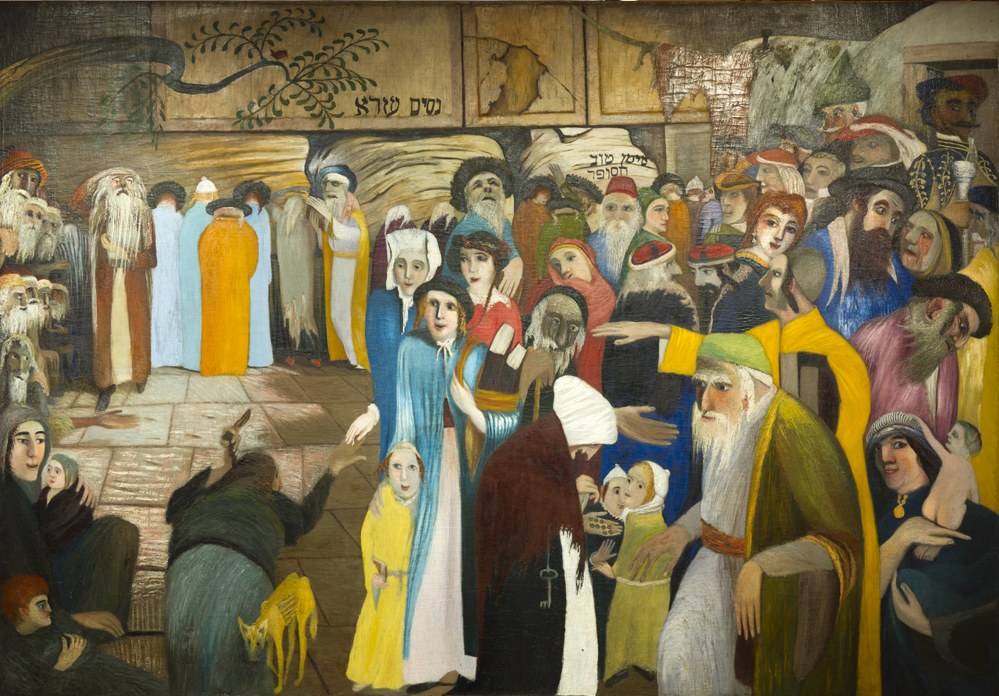
 Click here to return to The Life of Yeshua: A Suggested Reconstruction main page.
_______________________________________________________
Click here to return to The Life of Yeshua: A Suggested Reconstruction main page.
_______________________________________________________
Paid Content
Premium Members and Friends of JP must be logged in to access this content: Login
If you do not have a paid subscription, please consider registering as a Premium Member starting at $10/month (paid monthly) or only $5/month (paid annually): Register
One Time Purchase Rather Than Membership
Rather than purchasing a membership subscription, you may purchase access to this single page for $1.99 USD. To purchase access we strongly encourage users to first register for a free account with JP (Register), which will make the process of accessing your purchase much simpler. Once you have registered you may login and purchase access to this page at this link:
- [1] The prayer recorded in Matt. 6:9-13 // Luke 11:2-4 has been called “the Lord’s Prayer” at least since the time of Origen (late second to mid-third century C.E), who referred to τοῦ κυρίου προσευχή (“prayer of the Lord”; De oratione [On Prayer] 18:1 [ed. Koetschau, 2:340]). See Betz, 370. ↩
- [2] At least one of Jesus’ disciples, Peter, was married and may have had children prior to being engaged as a full-time disciple. There is no reason to suppose that there could not have been other full-time disciples in a similar situation. ↩
- [3] Cf. Montefiore, 118; Cadbury, Making, 233; Knox, 2:60-61. Bivin and Tilton owe the suggestion that the Lord’s Prayer, Persistent Widow, Friend in Need, and Fathers Give Good Gifts pericopae all belonged to a narrative-sayings complex on prayer to Robert Lindsey. See Lindsey, JRL, 111-113. ↩
- [4] It appears, however, that the author of Luke swapped out the more original form of the Lord’s Prayer, the one reflected in Matthew, for a simpler, less Hebraic form of the prayer, which he found in his second source, the First Reconstruction. ↩

